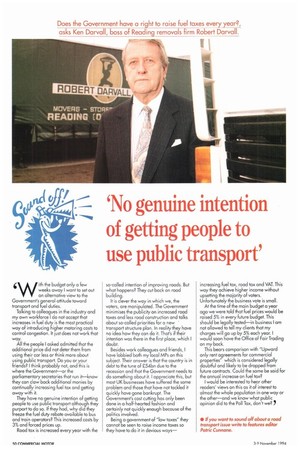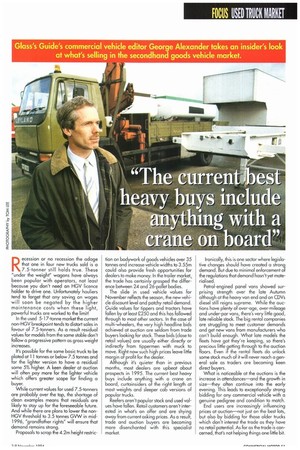'No genuine intention of getting people to use public transport'
Page 52

Page 53

If you've noticed an error in this article please click here to report it so we can fix it.
4 w
ith the budget only a few weeks away I want to set out an alternative view to the Government's general attitude toward transport and fuel duties. Talking to colleagues in the industry and my own workforce I do not accept that increases in fuel duty is the most practical way of introducing higher motoring costs to control congestion. It just does not work that way. All the people I asked admitted that the additional price did not deter them from using their car less or think more about using public transport. Do you or your friends? I think probably not, and this is where the Government—or the parliamentary secretaries that run it—know they can claw back additional monies by continually increasing fuel tax and getting away with it. They have no genuine intention of getting people to use public transport although they purport to do so. If they had, why did they Freeze the fuel duty rebate available to bus and train operators? This increased costs by 3% and forced prices up. Road tax is increased every year with the so-called intention of improving roads. But what happens? They cut back on road building. It is clever the way in which we, the voters, are manipulated. The Government minimises the publicity on increased road taxes and less road construction and talks about so-called priorities fora new transport structure plan. In reality they have no idea how they can do it. That's if their intention was there in the first place, which I doubt.
Besides work colleagues and friends, I have lobbied both my local MPs on this subject. Their answer is that the country is in debt to the tune of £54bn due to the recession and that the Government needs to do something about it. I appreciate this, but most UK businesses have suffered the some proUem and those that have not tackled it quickly have gone bankrupt. The Government's cost cutting has only been done in a half-hearted fashion and certainly not quickly enough because of the potitics involved.
Being a government of "low taxes" they cannot be seen to raise income taxes so they have to do it in devious ways—
increasing fuel tax, road tax and VAT. This way they achieve higher income without upsetting the majority of voters. Unfortunately the business vote is small. At the time of the main budget a year ago we were told that fuel prices would be raised 5% in every future budget. This should be legally tested—in business I am not allowed to tell my clients that my charges will go up by 5% each year. I would soon have the Office of Fair Trading on my back. This bears comparison with "Upward only rent agreements for commercial properties" which is considered legally (doubtful and likely to be dropped from future contracts. Could the same be said for the annual increase on fuel tax?
I would be interested to hear other readers' views on this as it of interest to almost the whole population in one way or the other—and we know what public opinion did to the Poll Tax, don't we?
Recession or no recession the adage that one in four new trucks sold is a 7.5-tonner still holds true. These "under the weight" wagons have always been popular with operators, not least because you don't need an HGV licence holder to drive one. Unfortunately hauliers tend to forget that any saving on wages will soon be negated by the higher maintenance costs when these light, powerful trucks are worked to the limit!
In the used 5-17-tonne market the current non-HGV breakpoint tends to distort sales in favour of 7.5-tonners. As a result residual values for models from the same stable don't follow a progressive pattern as gross weight increases.
Its possible for the same basic truck to be plated at 11 tonnes or below 7.5 tonnes and for the lighter version to have a residual some 5% higher. A keen dealer at auction will often pay more for the lighter vehicle which offers greater scope for finding a buyer.
While current values for used 7.5-tanners are probably over the top, the shortage of clean examples means that residuals are likely to stay up for the foreseeable future. And while there are plans to lower the nonHGV threshold to 3,5 tonnes GVW in mid1996, "grandfather rights" will ensure that demand remains strong.
Proposals to scrap the 4.2m height restric
tion on bodywork of goods vehicles over 35 tonnes and increase vehicle widths to 3.55m could also provide fresh opportunities for dealers to make money. In the trailer market,. the trade has certainly grasped the difference between 24 and 26-pallet bodies. The slide in used vehicle values for November reflects the season, the new vehicle discount level and patchy retail demand. Guide values for tippers and tractors have fallen by at least 2250 and this has followed through to most other sectors. In the case of multi-wheelers, the very high headline bids achieved at auction are seldom from trade buyers looking for stock. These bids (close to retail values) are usually either directly or indirectly from tippermen with muck to move. Right now such high Jprices leave little margin of profit for the dealer. Although it's quieter than in previous months, most dealers are upbeat about prospects in 1995. The current best heavy buys include anything with a crane on board, curtainsiders of the right length at most weights and sleeper cab versions of popular trucks.
Reefers aren't popular stock and used values have fallen. Retail customers aren't interested in what's on offer and are shying away from current asking prices. As a result, trade and auction buyers are becoming more disenchanted with this specialist market. Ironically, this is one sector where legislative changes should have created a strong demand. But due to minimal enforcement of the regulations that demand hasn't yet materialised.
Petrol-engined panel vans showed surprising strength over the late Autumn although at the heavy van end and on CDVs diesel still reigns supreme. While the auctions have plenty of over-age, over-mileage and under-par vans, there's very little good, late reliable stock. The big rental companies are struggling to meet customer demands and get new vans from manufacturers who can't build enough. What late models the fleets have got they're keeping, so there's precious little getting through to the auction floors. Even if the rental Fleets do unlock some stock much of it will never reach a general sale as traders are becoming keen direct buyers. What is noticeable at the auctions is the increase in attendances—and the growth in size—they often continue into the early evening. This leads to exceptionally strong bidding for any commercial vehicle with a genuine pedigree and condition to match. End users are increasingly influencing prices at auction—not just on the best lots, but also by bidding for those older trucks which don't interest the trade as they have no retail potential. As far as the trade is concerned, that's not helping things one little bit.
































































































